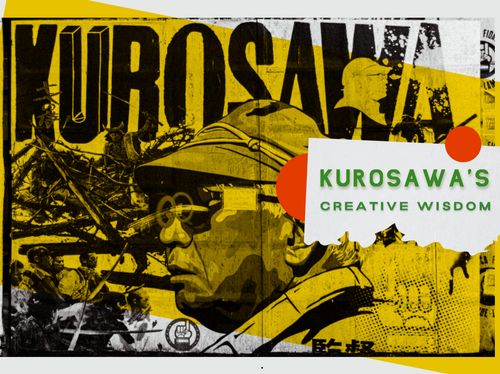Creative advice from a master of cinema: Akira Kurosawa on writing
Aug 19, 2021 · 2 mins read
0
Share

When people asked Akira Kurosawa for creative advice – whether it was an aspiring filmmaker or one of the assistant directors he worked with – his answer was the same: learn to write.
Save
Share
The Japanese director is considered one of the most important and influential figures in the history of cinema, creating 30 films in 57 years. He was also a painter, screenwriter, editor, and producer. But Kurosawa saw the written word as the bedrock of artistic expression...
Save
Share
In order to be great at filmmaking, he said, one must write scripts. That’s how you learn the specifics of film structure and develop a true understanding of how cinema works.
Save
Share
But Kurosawa found that when he shared this wisdom with others, they didn’t get far with it. Writing just seemed too hard for them – and, let’s face it, it is hard! But writing is also an exercise in building patience…
Save
Share
In the documentary My Life in Cinema, Kurosawa cited Balzac as a perfect example of the industrious spirit you need in order to create. Balzac produced more work than most of us could read in our lifetime, yet behind it all was an extremely simple mindset...
Save
Share
The most essential ingredient to being a writer, Balzac believed, is the strength to face the monotony of crafting one word at a time. Kurosawa took that to heart. He maintained that once you get used to putting one foot in front of the other creatively, it becomes second nature.
Save
Share
"When you go mountain climbing, the first thing you’re told is not to look at the peak but to keep your eyes on the ground as you climb..You just keep climbing patiently one step at a time. If you keep looking at the top, you’ll get frustrated. I think writing is similar."
Save
Share
The trick is to view creative work as a routine, rather than some tortuous chore or something you do only when inspiration strikes. Kurosawa said that, at worst, a day of writing will produce 2-3 pages – and therefore a couple of hundred pages is an entirely realistic goal.
Save
Share
If you give up, you set a precedent – you will quit whenever things get hard. Kurosawa always warned his assistant directors about this: you must keep going, no matter what, until some kind of ending has been reached.
Save
Share
Just remember: You can’t create something out of nothing. So read the classics; catalogue your memories. Make sure you have a rich reserve of material inside yourself. Once you have that, all you need is a pen, some paper, and patience.
Save
Share
0